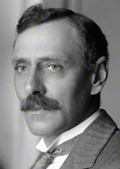 |
Nicolaas Jacobus de Wet
b. 11 Sep 1873, Mooifontein, Aliwal North disctrict, Cape Colony
d. 16 Mar 1960, Pretoria, Union of South Africa |
| Title: |
Officer Administering the Government of the Union of South Africa :: Amptenaar Belas met die Uitoefening van die Uitvoerende Gesag van die Unie van Suid-Afrika |
| Term: |
19 Jul 1943 - 31 Dec 1945 |
| Chronology: |
17 Jul 1943, duties of the office of Governor-General of the Union of South Africa devolved upon the officer designated by Art. VI of the Letters Patent Relating to the Office of Governor-General of the Union of South Africa due to the death of an incumbent [1] |
| |
19 Jul 1943, took an oath of allegiance and an oath of office as Officer Administering the Government, Libertas (official residence of the Prime Minister), Pretoria [2] |
| |
22 Aug 1943,
appointed by Commission under the Royal Sign Manual and Signet [3] |
| |
31 Dec 1945, appointment superseded by the Commission of a successor effective on 1 Jan 1946 [3] |
| Biography: |
| Eldest son of Nicolaas Jacobus de Wet, a member of the Legislative Assembly of Cape Colony; received his early education at the Aliwal North Public School before proceeding in 1889 to the Victoria College (now the University of Stellenbosch); obtained the bachelor of arts degree with honours in literature and philosophy (1893); read law as a non-collegiate student at Downing College, Cambridge (1893-1895), gaining the bachelor of law degree in 1895; admitted to the bar in Cape Colony (1896); was appointed King's Counsel and admitted as advocate of the Supreme Court of Cape Colony (1896); moved to the South African Republic (Transvaal) and was admitted to the High Court and opened chambers in Pretoria (1896); during the Second Anglo-Boer War (1899-1902), he served as Chief Censor and Assistant State Attorney; accepted the post of military secretary to General Louis Botha; acted as interpreter in the negotiations which led to the Treaty of Vereeniging (1902); resumed his legal practice and also entered politics, becoming an executive member of the Het Volk party (1904-1910); represented Middelburg West in the Legislative Assembly of the Transvaal (1907-1910); was elected to the House of Assembly of the Union of South Africa as a member for Wakkerstroom (1913-1915) and Potchefstroom (1915-1920) on the ticket of the South African Party; chosen as a member of the Senate of the Union (1921-1929) for the Transvaal; served as minister of justice (1913-1924) in the cabinets of Botha and Jan Christiaan Smuts; resumed his private law practice in 1924; was appointed to the Transvaal provincial division of the Supreme Court (1932-1937); appointed judge of the Appellate Division of the Supreme Court (1937-1939), becoming Chief Justice of the Union (1939-1943); appointed a member of the U.K. Privy Council (17 Nov 1939); served on more than one occasion as Officer Administering the Government during the illness of Sir Patrick Duncan; assumed the functions of Governor-General after the death of Duncan (17 Jul 1943) and was offered to be appointed to that office, but declined; before the expiration of his term as Chief Justice, he was commissioned as Officer Administering the Government (22 Aug 1943) until the appointment of a new Governor-General; chosen as chancellor of the University of South Africa in 1943, presiding over that institution during its years of transition from a federal to a unitary teaching university, remaining in office until 1951. |
| Biographical sources: "Dictionary of South African Biography", ed. by W.J. de Kock, D.W. Krüger (et al.) (Pretoria: Nasional Boekhandel Bpk. for National Council for Social Research, Dept. of Higher Education, 1968-1987), 5 vols; obituaries: Rand Daily Mail, 17 Mar 1960, p. 5; The Times, No. 54,722, Royal Edition, 17 Mar 1960, p. 19. |
| |
| [1] |
Government Gazette, No. 2419, Extra, 16 Mar 1937, pp. ii-iv; Government Gazette, No. 3222, Extra, 19 Jul 1943. |
| [2] |
Rand Daily Mail, 20 Jul 1943, p. 3. |
| [3] |
Government Gazette, No. 3587, Extra, 1 Jan 1946, p. 2. |
| |
Image: photograph (1923) |

